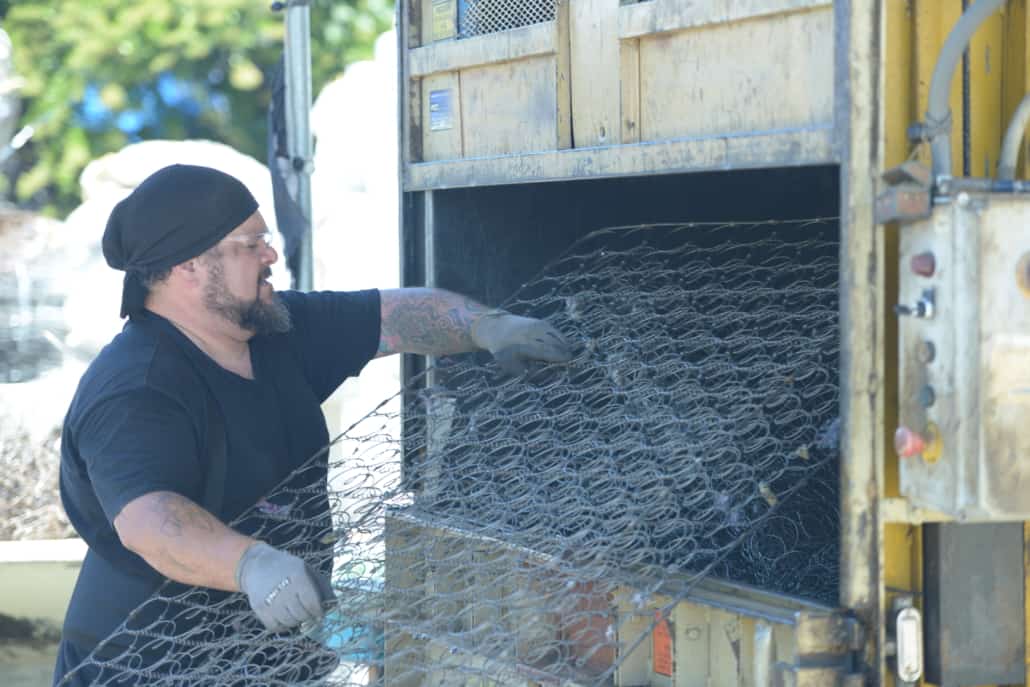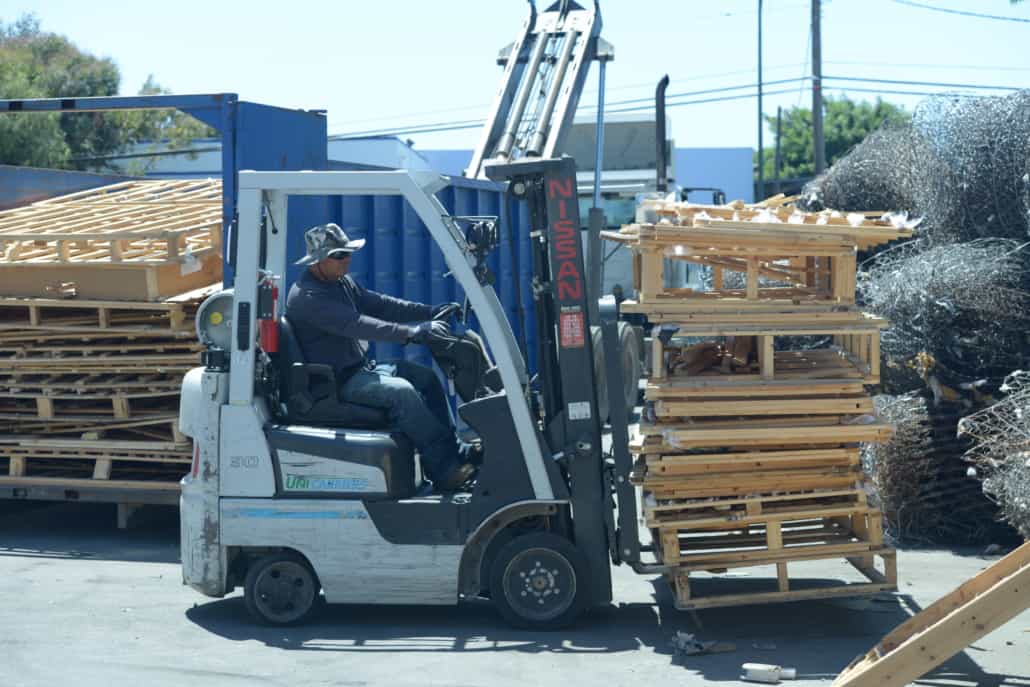The Mattress Recycling Council marks major milestones as it continues to raise awareness about mattress recycling, and make recycling easier and more efficient for states
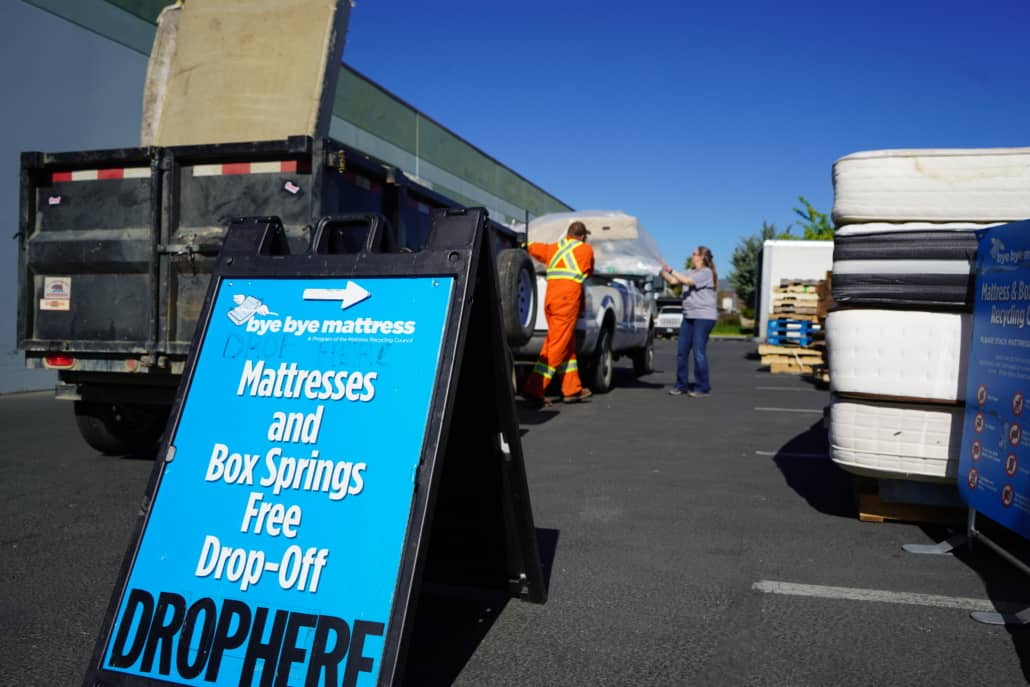
The Mattress Recycling Council has recycled more than 6 million mattresses in California, Connecticut and Rhode Island — a major milestone as it marks its fifth anniversary this year.
Those more than 6 million recycled mattresses equate to more than 214 million pounds of steel, wood, foam and other materials diverted from landfills and used to make other products.
The numbers are impressive. For the more visually oriented, we’ll put it this way: All those recycled mattresses could be laid end to end from California to Connecticut to Rhode Island — and back again, with nearly 1,500 miles to spare.
Like other segments of the mattress industry, the COVID-19 pandemic has put stresses and strains on mattress recycling since the novel coronavirus began to spread across the United States in the spring.
But “the Mattress Recycling Council continues to operate a program that improves year over year,” says Mike O’Donnell, MRC managing director. “We are always moving forward, increasing efficiency, incubating innovation, growing our network and finding ways to support a more sustainable environment.”
Here we’ll look at more of what MRC has accomplished in its first five years — and what is ahead.
How it all works
MRC, a nonprofit organization founded by the bedding industry, operates the legislatively mandated statewide recycling programs in California, Connecticut and Rhode Island.
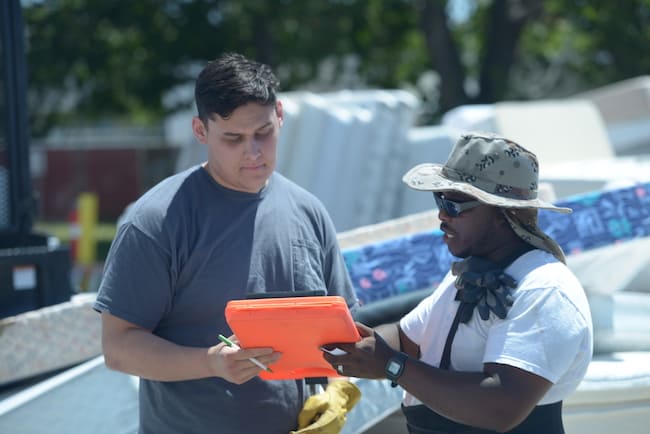
Big and bulky, mattresses and foundations take up a lot of valuable space if landfilled, but by dismantling them, a majority of their components can be recycled and turned into new consumer and industrial products.
Point-of-sale fees paid by consumers on each mattress and foundation sold in the three states fund mattress collection, transportation and recycling efforts, with more than 1.5 million mattresses now recycled annually. Mattresses are collected through a variety of channels, giving retailers, consumers and others convenient, no-cost ways to responsibly dispose of used mattresses. (See story on page 26 for a look at the recycling programs, state by state.)
MRC calls its consumer-facing brand Bye Bye Mattress and has developed a unique logo and website to educate consumers about the value of mattress recycling through point-of-sale materials, public service announcements, social media campaigns, digital communications, outreach at events and paid advertising. In short, Bye Bye Mattress gets the word out. Since its launch, more than 1 million visitors have visited ByeBye-Mattress.com, where consumers can use a locator tool to find the nearest mattress recycling location or event in California, Connecticut and Rhode Island. A new feature on the website offers residents in other states a list of known mattress recyclers across the country.
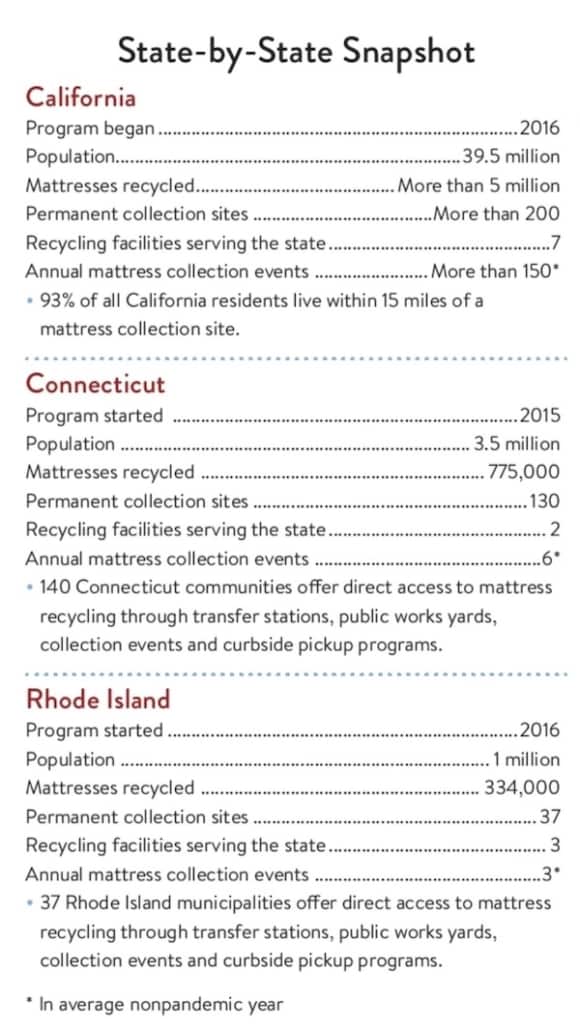
Not resting on early accomplishments
MRC continues to evolve as it seeks to grow awareness of the importance of recycling, reduce the number of mattresses going into landfills, make recycling easier for state residents and improve efficiencies throughout the recycling network.
Let’s start with a quick rundown of some notable recent changes. On Jan. 1, 2020, California expanded MRC’s recycling program to include futons, as well as the traditional bed mattresses and foundations it had been collecting since 2016. Beginning Jan. 1, 2021, California will require e-commerce retailers who deliver mattresses to consumers in the state via common carriers (such as UPS and FedEx) to offer no-cost take back of a used mattress.
On the communications front, over the summer, MRC launched a new retailer outreach effort to improve its customer service.
“The program is designed to provide support, resources and the latest program updates. We want to make sure retailers have everything they need to communicate with customers about the fee and the benefits of mattress recycling, and understand their obligations under the state law. There is a survey they can fill out, and we follow up by phone and review a checklist. We want to make it easy while also answering any questions,” says Lori Barnes, MRC manager of industry communications.
In its initial outreach effort, MRC is contacting every registered mattress retailer via email and phone, first in Rhode Island and then in Connecticut and California. “Our goal is to connect with every retailer in the program at least once a year,” Barnes says.
This fall, MRC is relaunching its website, MattressRecyclingCouncil.org, with a fresh look, new features and improved usability.
One of MRC’s goals is to get the word out about the problem. A PSA to discourage illegal dumping has gotten more than 3 million views, Barnes says.
In 2016, MRC launched its Illegally Dumped Mattress Collection Initiative that now pays nonprofit organizations and others $15 per unit to collect illegally dumped mattresses. The first year, the program had 40 participants and collected nearly 24,000 units. By the end of 2019, it had grown to 66 participants and collected 183,000 units, says Justine Fallon, MRC director of operations.
The initiative helps to clean up alleyways, vacant lots and other sites — and has removed nearly 200,000 mattresses to date. It also aids MRC in gathering valuable data about where those mattresses are dumped. “We now have ZIP code data and can better see where illegal dumping hot spots are,” Fallon says.
As a next step, MRC plans to fund two or three pilot projects that focus on education/outreach, eradication or collection infrastructure improvements, and will use data from the illegal dumping initiative to help assess the effectiveness of the pilots. The projects, which could receive up to $100,000 in funding each, should be completed by the end of 2021, Fallon says.
As another part of its overall effort on this front, in late 2018 and early 2019, MRC hosted two workshops in California to discuss causes of illegal dumping and brainstorm possible solutions with a variety of stakeholders. A report on the workshops’ findings and proposals has been sent to several U.S. and Canadian experts on the causes of illegal dumping, who are drafting a white paper with recommendations for California lawmakers, regulators and other decision-makers, Fallon says. The white paper is expected this fall.
Expanding access for retailers and others:
To make recycling easier and more efficient for retailers, universities, hotels, and other businesses and organizations that collect large numbers of used mattresses, MRC operates the Commercial Volume Program. Connecticut and Rhode Island have operated their commercial efforts since their statewide recycling programs launched and together have more than 400 registered participants. The program in California began in 2019 and now has 48 retailers with 250 storefronts, 21 educational institutions and 50 hotels participating, with continued growth expected, Fallon says.
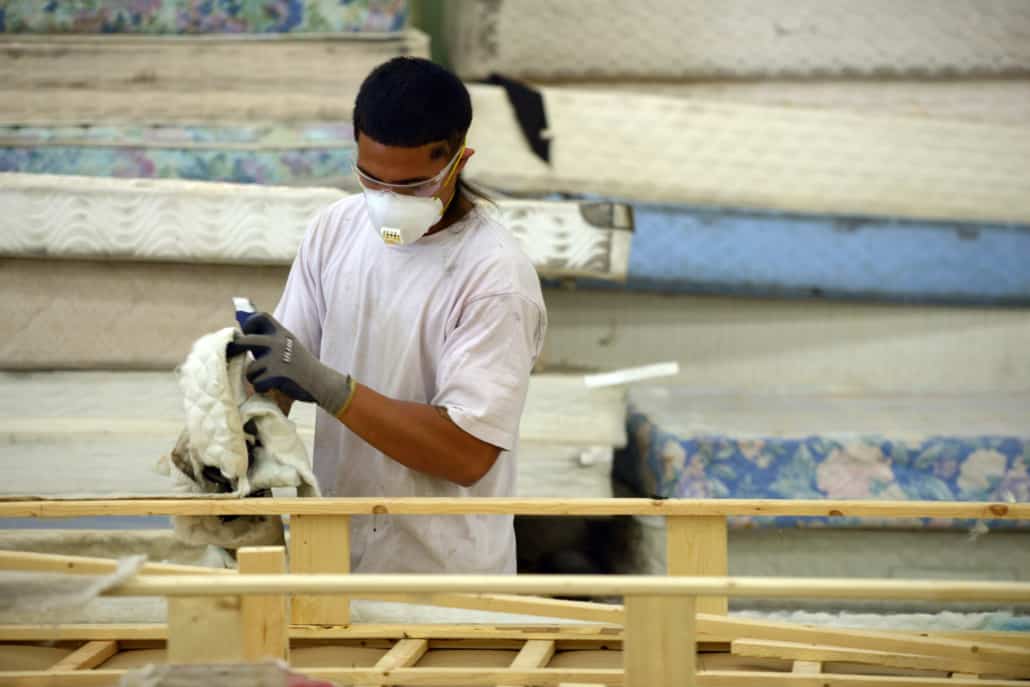
Requirements and procedures vary slightly from state to state. In California, for instance, businesses need to have collected at least 100 units to recycle to participate in the program. Retailers that collect 100 units or more each month can request a permanent storage container and monthly pickup (or more frequent pickup, if needed). Other businesses that have more sporadic need for pickup or that collect smaller numbers of mattresses can arrange for pickup as needed. MRC also has expanded commercial access at solid waste facilities and other locations for businesses that generate smaller numbers of used mattresses. Retailers and others can check ByeByeMattress.com to find a site near them that accepts commercial volumes. All of these services are provided at no cost to the businesses.
“We’ve done a lot of outreach and advertising since the program launched in California and built good partnerships with lodging associations and others to push information to their members,” Fallon says. “And we’ve seen a really nice trajectory in retailers participating.”
Partnering to extend MRC’s reach:
Throughout its initiatives and programs, MRC strives to be inclusive and to reach diverse communities, which can be disproportionately affected by illegal dumping and often don’t have access to services, such as regular municipal bulky item pickup.
For that reason, much of the information Bye Bye Mattress publishes for consumers about mattress recycling, whether it’s a PSA about illegal dumping or a poster about recycling fees, is available in English, Spanish and additional languages. MRC also offers translation services free of charge through its registration and reporting portal, MRCReporting.org, and through its customer service department.
MRC also teams up with organizations that have connections or existing programs in underserved communities. Partners include the Conservation Corps, Goodwill, Habitat for Humanity and CalEPA’s Environmental Justice Task Force. Such organizations frequently assist with publicity and illegal dumping cleanups or allow their facilities to be used as mattress collection sites, Fallon says. They also co-sponsor mattress collection events, promoting a consumer incentive program that pays residents a nominal amount (between $1 and $3, depending on the state) for dropping off a mattress to be recycled.
The partnerships offer MRC a number of benefits. “For example, Habitat for Humanity has the infrastructure to support a collection site because they already are set up with payment systems and already have people dropping off furniture and other donations,” Fallon says. “With the Conservation Corps, they can provide labor for us for a collection event. They have a good management structure and staff, so we know when we’re going to do a project with them, it’s going to be done well. We’re looking to expand to work with more groups whose missions align really nicely with ours.”
Researching new uses and methods:
MRC has a robust research program, investing $1 million a year in a variety of projects to develop new end markets for components, improve transportation networks and collection sites, and identify other industry best practices to make mattress recycling more efficient. To best use those dollars, MRC focuses on research that “rewards learning, and encourages managed risk-taking,” O’Donnell says. “All of our projects have milestones that are intended to produce results and validate the research investment.”
A recent project “provided lean manufacturing assessments of California recyclers to provide a baseline understanding of how each facility could optimize its facility configurations, throughput and other operations,” O’Donnell says.
Another MRC research goal is to find ways to improve the recyclability of mattress components. In 2019, MRC awarded a contract to a design firm to develop a low-cost automated machine to do one of the most difficult mattress dismantling tasks: efficiently separating steel coils from fabric in pocketed coil units. “MRC is now concluding that research project and will be assessing whether a business case exists to develop commercial-scale machines that individual recyclers could afford to purchase and use at their locations,” O’Donnell says.
Last year, MRC also began to work with other industry leaders and groups to explore the development of a circular economy for mattress materials. Youmatter, an online news analysis site, explains the difference between a linear and circular economy this way: “In the linear economy, raw natural resources are taken, transformed into products and get disposed of. … A circular economy model aims to close the gap between the production and the natural ecosystems’ cycles — on which humans ultimately depend upon. This means (among other things) eliminating waste — composting biodegradable waste or, if it’s a transformed and nonbiodegradable waste, reusing, remanufacturing and finally recycling it.”
As part of that effort, MRC has entered into a joint research agreement with Covestro, a global manufacturer of polyurethane chemicals used to make mattress foams, to improve mattress recycling. Among other things, this joint effort focuses on creating commercially and environmentally viable solutions for converting post-consumer flexible foam into a wide array of useful products. These solutions could potentially include “closed-loop” flexible foam — used foam that is converted back to its chemical components, which are then used to make new foam.
Making mattress facilities more efficient:
As part of a broader focus on environmental sustainability, in 2019, MRC launched the Sleep Products Sustainability Program to help mattress manufacturers reduce waste, saving them money and making their operations more efficient. The program, SP2 for short, offers training and certification at no cost to manufacturers in California that want to improve operations at their production plants, distribution centers, warehouses and/or offices. Pleasant Mattress, based in Fresno, California, completed its training and is working toward certification. Two other mattress facilities are undergoing training, and additional companies are in the pipeline to begin training. MRC may eventually expand the program to California suppliers and retailers and also to companies in other states.
This year, MRC hired Ryan McMullan, principal consultant with Lean Green Way in Long Beach, California, to coordinate training and further develop the program, Fallon says. McMullan has two decades of experience helping manufacturers develop sustainability programs and has worked with organizations such as Toyota and Rice University.
Looking ahead
“In five years, MRC has come a long way in addressing a problem that has vexed the mattress industry for decades: How can we efficiently recycle the thousands of mattresses Americans discard daily? With strong support from the industry, government and other stakeholders, MRC established three statewide programs. We assembled a talented team of industry leaders on our board, professional staff and recyclers. Last year, MRC processed 1.5 million units,” says Ryan Trainer, president of MRC and president of the International Sleep Products Association.
“Now that we have moved beyond the startup phase, MRC is taking action to reduce waste and make mattress recycling more efficient and sustainable. We are also working hard to find new markets and uses for mattress materials and to improve how we serve retailers and other stakeholders,” Trainer says. “Along the way, we have developed a proven funding and operational model that other states interested in establishing their own statewide mattress recycling programs can use. I am proud to have been part of MRC since its inception and am excited about what its future holds.”
Other States Consider Expanding Mattress Recycling
Although California, Connecticut and Rhode Island are the only states with statewide mattress recycling laws, other states are considering programs or legislation to increase or mandate mattress recycling.
The mattress industry works with lawmakers, regulators, manufacturers, retailers, recyclers, haulers and other stakeholders when states or other jurisdictions have an interest in beginning or expanding mattress recycling, says Marie Clarke, vice president of policy and government affairs for the International Sleep Products Association. Clarke also is vice president of industry and external affairs for the Mattress Recycling Council, which manages the recycling programs in California, Connecticut and Rhode Island.
“We represent the industry’s goals, including responding to local, grassroots interest in mattress recycling,” Clarke says. “We don’t walk into a state or other jurisdiction assuming what’s best for them.”
That said, through the MRC’s programs in California, Connecticut and Rhode Island, the mattress industry has developed a great deal of experience and expertise in what makes an efficient, cost-effective mattress recycling program and has developed best practices it can share with stakeholders.
“If we have folks interested in starting a mattress recycling program — usually it starts with a state or local government — then we want to have a conversation,” Clarke says. “What are you currently doing with mattress disposal? What’s working? What isn’t? Is this proposed legislation something that could conceivably pass? How might it need to be improved? We want to hear where the interest in mattress recycling is coming from and whether the effort is feasible.”
Clarke walked BedTimes though current mattress recycling proposals in several states. As you might imagine, the COVID-19 pandemic has delayed or sidelined some efforts, at least for now, she says.
Maine
Maine passed a law in 2019 requiring its Department of Environmental Protection to study and issue a report on the feasibility of mattress recycling. The report, issued in late 2019, recommended that the state begin a pilot recycling program, which likely will be in the Lewiston-Auburn area. The mattress industry is working with stakeholders, including Goodwill Northern New England, retailers, waste haulers and others, to create that pilot program. Organizers hope to get a grant from the state’s Department of Environmental Protection and expect to launch the pilot effort in spring 2021, Clarke says.
Massachusetts
The Massachusetts Department of Environmental Protection has proposed a ban on the disposal of mattresses in landfills as part of its 2030 Solid Waste Master Plan, which lays out the state’s solid waste strategy for the coming decade. Massachusetts expects, at current rates, to run out of landfill capacity in mid-2030, and mattresses, as big, bulky items, take up a lot of space. The master plan was open for public comment through Sept. 15. Meanwhile, two companion bills have been introduced (Resolve S. 495 and Resolve H. 765) to study mattress recycling in the state. Clarke does not expect either bill to pass this year.
New York
New York Gov. Andrew Cuomo included a mattress recycling mandate in his budget earlier this year, but the COVID-19 pandemic shifted priorities and the state passed a budget without it, Clarke says. Given the continuing pandemic and the stress it is placing on state budgets, it is uncertain whether New York lawmakers will reconsider mattress recycling this year, Clarke says.
Oregon
Bills that would mandate statewide mattress recycling have been introduced in Oregon’s legislative assembly the past two years but have not passed, Clarke says. The mattress industry continues to work with Oregon lawmakers and stakeholders to refine legislative proposals, and Clarke expects a bill to be reintroduced in 2021.
A consistent approach
Because uniformity is helpful to mattress manufacturers and retailers, the mattress industry supports consistent mattress recycling laws, although the industry recognizes that each jurisdiction or state has unique circumstances and conditions that can require some variability, Clarke says.
With several states in the Northeast considering mattress recycling programs or mandates, Clarke says opportunities exist for a cohesive, regional approach that could benefit the entire area.
“Just like with the pandemic,” Clarke says, “waste doesn’t stop at a state’s border. A cohesive approach could benefit several states.”
RECYCLING FEE FACTS
On Jan. 1, 2021, the recycling fee consumers pay when they purchase a mattress or foundation in Connecticut will increase from $9 a unit to $11.75 a unit. It is the first fee increase since the Connecticut program launched in 2015 and is necessitated by increased labor costs and operational expenses.
Fees for each unit purchased in the other two states will remain the same: $10.50 in California and $16 in Rhode Island.
California: All Retailers Must Offer to Pick Up Used Mattresses
Beginning on Jan. 1, 2021, all retailers that deliver a new mattress to a consumer in California must offer to pick up a used mattress at no additional cost to the consumer. The requirement applies regardless of how the consumer purchases a mattress (in-store, online, etc.) or how it is delivered (by store-employed delivery team, by contract delivery team, common carrier, etc.).
Since the statewide recycling program began in 2016, retailers that have delivered a mattress to a consumer through a method other than common carrier (such as via a store-employed delivery team) have been required to offer to pick up a used mattress at time of delivery.
AB 187, an amendment to California’s Recovery and Recycling Act (SB 254) that Gov. Gavin Newsom signed in October 2019, expands the retailer take-back requirement so that beginning Jan. 1, 2021, any retailer, such as an e-tailer, that sells a mattress delivered by common carrier (such as FedEx, UPS or USPS) must offer to arrange to pick up a used mattress from the consumer within 30 days after the new mattress is delivered.
Retailers are not obligated to pick up a used mattress if it is contaminated and poses a risk to personnel, new products or equipment.
The Mattress Recycling Council has been working for more than a year to make sure online mattress sellers are aware of the new requirements, running ads in industry publications, posting articles on its websites and social channels, and doing direct outreach to retailers, among other efforts.
Learn More
To learn more about the Mattress Recycling Council and its Bye Bye Mattress consumer-focused arm, visit MattressRecyclingCouncil.org and ByeByeMattress.com. Both websites have a wealth of information about mattress recycling and useful resources. MRC and Bye Bye Mattress also are active on social media. Follow them on Facebook, Twitter and LinkedIn.




